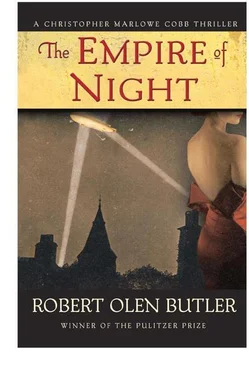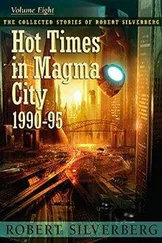Not yet.
“I have no close relatives here,” I said.
“That does not matter,” he said.
“I have to confess,” I said.
I took a bolt of beer. I let him wait for the rest, as he’d done with me a few times already. Then I said, “I was exhilarated by the Zeppelins flying over us on Friday night. I knew where they were going and what they intended to do, but nevertheless. .”
I stopped again, as if I did not know how to express what I wanted to say. That the bombing of London did not lessen the exhilaration.
Stockman said, “Nevertheless.” Not to prompt me to say more but to permit me to leave the thing unsaid. We already understood each other.
But I nudged him. “Do you disapprove?”
“I do not,” he said.
“Please don’t mistake me,” I said. “I admired your speech.”
He smiled just a little. “You were very shrewd to understand.” And he said in English, quoting my own words, “My speech was ‘to quell a panic, not to legitimize a foreign policy.’”
I said, “I find myself thinking about the Zeppelins. How they might end this war quickly.”
Stockman leaned back deeper into his chair. His mouth tightened, its line vanishing beneath his mustache.
I thought: He’s withdrawing now, for my mentioning this. But then the alternative: He’s thinking of his own mission somehow.
With his mouth still tight, he made one small nod.
And I knew my second thought was right. My mission in Germany was entirely about whatever was in his head at that very moment.
I said, “They are beautiful and terrifying but something still seems missing. The English close their curtains and go to the basements and have polite conversation.”
Stockman made a short, sharp smile that came and went so quickly that I could consider it only after it was gone.
And now the young German officers cried out as one for another round of beer. Politely. Vier Biere, bitte . They laughed at their harmony.
Stockman swung his face toward them, showing his chiseled profile, watching them in his periphery. Or watching me.
I had to back off.
Stockman looked my way again.
He lifted his stein, pausing it before him, pushing it ever so slightly in my direction. He was saying it was time to take a drink and change the subject.
I lifted my own beer in exactly the same way, saying, Okay . Saying, Of course . And we quaffed.
When our steins were down, Stockman squared his shoulders a little and said, “Madam Cobb is resting from her journey.”
He said this in English. On this subject we would speak English.
“She asked that I instruct you to visit her rehearsal at the Lessing Theater tomorrow morning,” he said.
I worked hard to understand his suddenly flat tone. Perhaps he was still suspicious of my arm around Isabel Cobb. But if that were truly a serious thing between us, surely this whole conversation would not have gone as it had so far.
He paused. But he had the air of a churning mind. Maybe he had to get a certain number of quaffs in him to stir all that back up.
Then he said, “She had an unsettling moment on Friday.”
He was focused on the scene I feared was still working in him, though his lead suggested a different concern from mine.
“She nearly fainted,” I said, glad to gently reinforce my excuse for touching her.
“She has died a thousand times on stage,” Stockman said, “but she has seen very little of that in real life.”
I heard my mother’s words in this. She’d been working on him.
“This was particularly difficult,” he said.
I nodded. I kept my mouth shut.
Stockman looked me in the eyes. I did not see suspicion. I saw him standing before his constituents, needing to act.
“Martin was a brave man,” he said, with an unmistakable tear-stifling tremor in his voice. He paused. It sounded convincing. He was a good actor.
I caught myself. He could be acting, but he could have legitimate feelings. In this present job of mine — in my job as a reporter, as well — I had to stay alert to the complexity of the human mind and heart. You tell yourself that your subject or your enemy is unremittingly bad, and you will fail. More than fail — you’ll compromise the value of what you’re doing, of who you are.
“Too brave sometimes,” Stockman said. There it was again in his voice, the snag at the man’s braveness, the breathy slide to finish the sentence.
He looked away. He took a moment.
He didn’t have to put on real feelings for me about a hired thug, not in this situation, not in any situation. He wasn’t acting.
“He fell from the tower,” Stockman said, composing himself with a statement of the obvious.
It was he who had initiated this further explanation of the death to me. That was Stockman the spy. I’d gotten near to his secret self a few moments ago, touching on the Zeppelins, and it prompted him to forestall any suspicion about the other big event from Friday. But he was sorry now he’d brought it up. He really couldn’t explain it anyway.
“He’d become careless,” he said, with a soft but clear thump of finality.
I could let the silence drag on to put the pressure on him to explain it further. But I knew the answer anyway. I said, “I’m very sorry about your man.”
We took another drink. Stockman said, “But it’s put Madam Cobb in a state.”
“It’s good she has her work,” I said, finishing the sentence in my head: nailing you.
“I suppose,” Stockman said.
And the four young German voices that had harmonized to call for a beer, the voices of these newly minted officers about to go to war, took up together once more, singing. “ Heil dir im Siegerkranz, Herrscher des Vaterlands .” The beginning of the anthem for the German Empire. “Hail to thee in victor’s crown, Ruler of the Fatherland.”
Stockman did not turn to them. He closed his eyes.
The enlisted men’s voices at the train station had rung to the rafters. These officers sang softly, thoughtfully, as if to a child, or to a fiancée. Even the next lines. Heil, Kaiser, dir. “Hail, Emperor, to you.”
Stockman, of course, had himself sung this very tune on Friday night in the wake of the Zeppelins. “God Save the King.” But this time the song’s lyrics flowed with pure German blood. His eyes still closed, Stockman began to sing. “ Fühl in des Thrones Glanz . .” “Feel the throne’s great glow. .”
Other voices from throughout the bar also began to sing. “. . Die hohe Wonne ganz .” “Fully the highest joy.”
Stockman opened his eyes, and he rose from his chair.
I rose too. I was in character. I was Josef Wilhelm Jäger. And yes I sang, my body suddenly prickling into gooseflesh. “ Liebling des Volks zu sein .” “To be the people’s beloved one.”
The bar was filled with voices now, rising together in blood and empire. “ Heil, Kaiser, dir! ”
And when we had done, the bar fell into a ringing silence. The silence held for a moment and a moment more and still another moment, and then bodies began to rustle and settle.
Voices resumed, low and murmuring.
A glass clinked from the bar.
Stockman sat down.
I sat down.
My chest was still swelled with the Zeppgas of a Bloodbonding.
I was far from home. The further irony struck me hard now: the precious melody for both Brits and Germans was also the melody for “My Country ’Tis of Thee.” Sweet land of liberty, of thee I sing.
As the sole American sitting in a German hotel bar, I came to this thought with no gooseflesh, no urge to sing. I’d already sung tonight. You can call it blood. You can call it nationhood or empire or Fatherland or family. All of it was, at its heart, the terrible, deep, human yearning for an identity. You find it by being part of something larger. Even an impromptu gathering of voices in a bar.
Читать дальше












